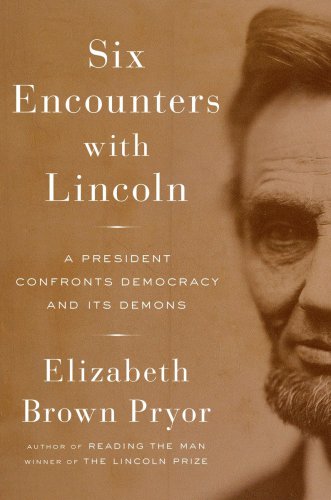
Six Encounters with Lincoln
A President Confronts Democracy and Its Demons
کتاب های مرتبط
- اطلاعات
- نقد و بررسی
- دیدگاه کاربران
نقد و بررسی

December 5, 2016
The late historian and diplomat Pryor (Reading the Man) left behind a manuscript that will cinch her legacy as a creative scholar. She uses six little-known interactions between American citizens and President Lincoln—either individually or in groups—as a means to parse the president’s thoughts on important political issues. What makes the encounters particularly fascinating is that the participants recorded them at the time, so they remain uncolored by the sentimentality of post-assassination remembrance. Pryor is intrigued by the ways in which the encounters demonstrate how Lincoln “both responded to and helped shape a new way of looking at democratic inclusion, not necessarily because he wanted to but because he had to.” An uncomfortable meeting between U.S. Army officers and their new commander-in-chief in March 1861 serves as an exploration of Lincoln’s abilities as a military leader. The recounting of a nearly botched flag-raising during the christening of a new Marine bandstand launches a meditation on what Lincoln’s storytelling abilities meant for his presidency. Meetings with the Cherokee leader John Ross and the writer Harriet Beecher Stowe show the president profoundly uncomfortable around people who weren’t white men. Pryor’s impressive final book will be of great appeal to legions of Lincoln aficionados. Illus. Agent: Deborah Grosvenor, Grosvenor Literary.

Starred review from December 1, 2016
Six little-known anecdotes about President Abraham Lincoln during fraught times and what they show about his character.Former U.S. senior diplomat Pryor (Reading the Man: A Portrait of Robert E. Lee Through His Private Letters, 2007, etc.), who died in a car accident in 2015, painstakingly unearths hidden episodes in the life of Lincoln as he was trying to manage a riven republic and civil war. The author gets beyond the hagiographic portrayals of Lincoln (one contemporary noted, "the murderer's bullet opens to him immortality"), allowing rare glimpses of the man as vulnerable, clumsy, inarticulate, and very human. In his new role as head of the armed forces on March 12, 1861--just days after his inauguration and the secession of the Confederate states--Lincoln had to view the parade of federal troops through the White House, led by Gen. Winfield Scott, who was not entirely trusted. Unfortunately, the meeting underscored the inexperience of the new leader. Another odd incident: during Lincoln's ceremonial role of hoisting the U.S. flag over a new Marine bandstand set up on the South Lawn of the White House in late June 1861, the huge flag ripped, severing the upper stripe and four of its stars--not a good omen. From here, Pryor launches into an elucidating look at Lincoln's "legacy of fun" and his love of storytelling--not to mention how his face was ripe for caricature. In August 1862, Sgt. Lucien P. Waters, who "abhorred slavery," managed an interview with the president to air his grievances about the Union's frustratingly slow advances and ask for a furlough; Lincoln, glum and exasperated over the issue of slavery, muttered about the "damned or Eternal niggar, niggar," shocking Waters and revealing Lincoln's conflicted state at the time. Another anecdote demonstrates his discomfort engaging one-on-one with women. Kudos to Pryor for offering readers something fresh about our 16th president--no small feat. Deeply researched, telling moments in the life of arguably the most written-about man in American history.
COPYRIGHT(2016) Kirkus Reviews, ALL RIGHTS RESERVED.

January 1, 2017
Pryor (Reading the Man) does the impossible in this insightful, lucid book by teaching us something new about 16th U.S. President Abraham Lincoln (1809-65). Using new primary sources that reveal personal encounters with the president, the author points to the ambitions and partisanship that drove Lincoln throughout his life and the often contradictory, conflicted, and convulsive politics and problems of a democracy beset by overbearing self interests, weak federal institutions, vainglorious men, and incompetent military leadership. Pryor scores Lincoln for his constricted understanding of military matters, bungling of the Fort Sumter crisis, misreading of supposed Southern Unionism, and sometimes unprincipled partisanship, among other failures. She argues that Lincoln did not grow into and remake the presidency as many scholars have insisted, and that his speeches belied his inability to communicate clearly and effectively. The man Pryor reimagines is at once complicated, conflicted, and consequential. VERDICT One might argue that by pulling away the shroud of sanctification that covered Lincoln after his assassination, Pryor sees only what those with a passing acquaintance of Lincoln knew. However, she successfully provides insight into a man who revealed and represented the imperfections, imperatives, and possibilities of a democratic people.--Randall M. Miller, St. Joseph's Univ., Philadelphia
Copyright 2017 Library Journal, LLC Used with permission.

























دیدگاه کاربران